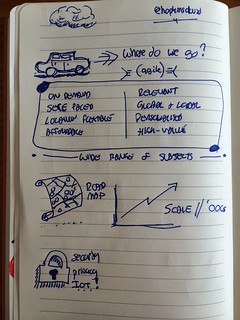How to innovate and educate ahead of the wave, Pt.1 #altc
‘Riding Giants: How to innovate and educate ahead of the wave’ is the title & theme for the 2014 ALT Conference – my first ALT conference.
With the conference themes being weaved thoughout the three days (education, innovate, communicate) the opportunities are here for all delegates to take what they need, give back (through questions, discussions, informal tweet ups, etc), and enhance not only their own ideas and practices but those around them.
I don’t want to say I’m surprised by the level of engagement, as that implies I might think that we (learning technology-type people) have such a low level of engagement or closed-door mentality at these events (which we don’t), but I am enthused and proud when I look around the room at the discussions and engagements that are taking place. From lunchtime to coffee breaks, to break-out activities to keynote speakers, this first day has been energetic and had a buzz around ‘being together’ I’ve not experienced since my first FOTE conference in 2009. There is clear symmetry in what we are all feeling as part of the Learning Technology fraternity these days; from MOOCs to student engagement, academic buy-in, digital literacy, experiences, virtual vs. real worlds, etc. as there are so many overlaps between session presentations.
Once again I’m Sketchnoting my way through the Keynote presentations (and more, when I can). I suddenly find myself out of practice so, dear reader, please excuse the less than involved renditions:
Jeff Haywood Keynote: Designing university education for 2025
Jeff held our attention well, making us all too aware of the different spaces we find ourselves occupying, as we journeyed with him through his and Edinburgh’s 2004-2025 transformation (it wasn’t always easy to see where his vision and Edinburgh’s vision differed, if indeed they do). So many nodding heads as academic apathy is mentioned, so many nervous laughs as we all realise how right he is when dealing with the speed (or lack thereof) of change. Is there life after MOOCs? Is it teaching or is it learning? Are ‘systems’ here to help us increase quality or productivity?
One thing Jeff said that made many people gasp with that sudden realisation of ‘oh, yes, we do that!’ was a simple observation about the level of marketing those of us involved in MOOCs make compared to the marketing we do for the paid-for courses we run. Indeed, the level of involvement between the two are unjustly balanced in favour of the MOOCs (despite Jeff saying he wouldn’t talk, much, about MOOCs).
Many of us present already have a good understanding of the issues or answers to Jeff’s questions; the pity is that this is why we’re here at ALTC, because we are the ones questioning the ‘system’. Perhaps we need to take ALTC on the road or get more students involved, use the student voice to try and wake the ‘sleepy’ academic minds?
Does anyone have a mechanism at their own institution where they are able to disseminate their ALTC experiences to their colleagues? If so please share below: link to your blog, description of your TEL set-up, etc.
I learned a new phrase today, in relation to reluctant or ‘sleepy’ academics … CAVES – Colleagues Against Virtually Everything.
The backchannel on Twitter was alive and kicking again, as I hoped it would be. It is certainly a good way to keep up with the sessions, especially the ones you can’t get to in the different streams, but it’s also a great social element to the conference, with many of us engaged in the difficulties of what to wear and what transpired as #shirtgate.
You can see all my ALTC sketchnotes on Flickr as I upload them on a daily basis (eventually) and blog about my ALTC journey ‘riding giants’.
See you again tomorrow for part two.
Original image credit: freepik.com





















One thought on “How to innovate and educate ahead of the wave, Pt.1 #altc”
Comments are closed.